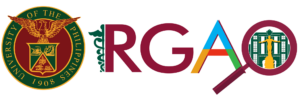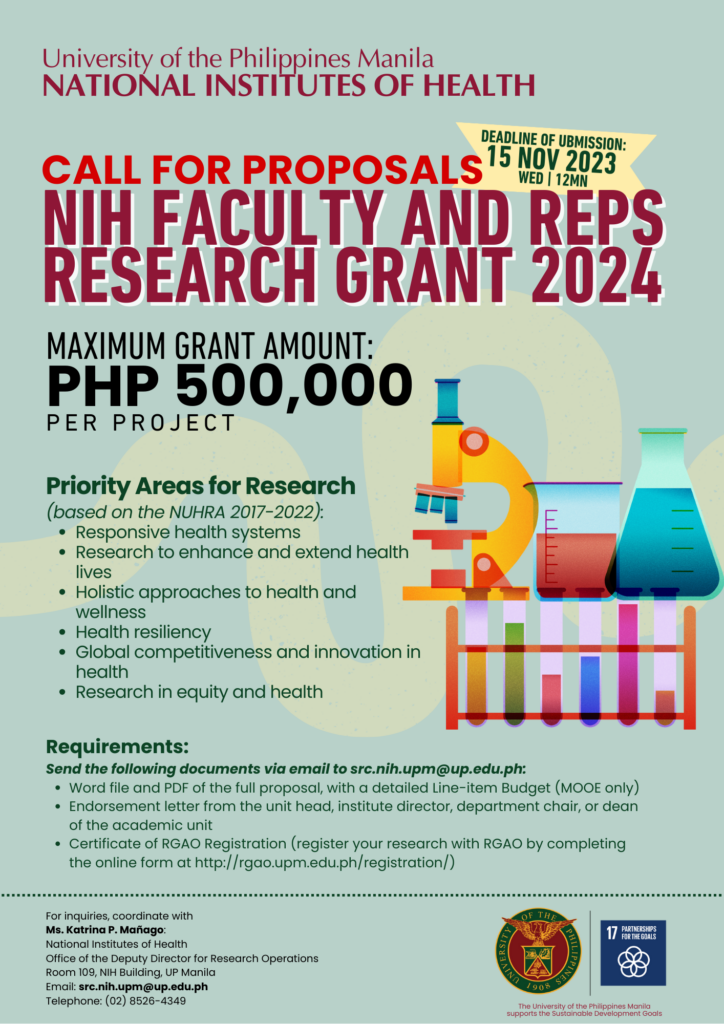The Council is pleased to inform NRCP members and researchers that the Call for Proposals for CY 2025 funding and implementation under the NRCP Grants-in-Aid (GIA) Program is now open. Please submit proposals that are aligned with the priority areas/programs under the National Integrated Basic Research Agenda (NIBRA) of the Harmonized National Research and Development Agenda (HNRDA) 2022-2028.
Proposals that forge linkages between the government particularly local government units (LGUs), academe, industry sector, and civil society, and most importantly projects that will ensure translation and transfer of social technologies to the people and various publics will be prioritized for funding.
https://basicresearch.nrcp.dost.gov.ph/callforproposals
The National Research Council of the Philippines (NRCP) continuously provides assistance to relevant fundamental/basic research and policy research to push for breakthrough projects with socio-economic benefits for the people. This is to ensure that new knowledge and information are generated to strengthen governance through the fusion of science and the arts, technology and innovation, hence, increase productivity and ensure efficient processes in the delivery of research results for public good.
The Council is pleased to inform NRCP members and researchers that the Call for Proposals for CY 2025 funding and implementation under the NRCP Grants-in-Aid (GIA) Program is now open. Please submit proposals that are aligned with the priority areas/programs under the National Integrated Basic Research Agenda (NIBRA) of the Harmonized National Research and Development Agenda (HNRDA) 2022-2028.
Proposals that forge linkages between the government particularly local government units (LGUs), academe, industry sector, and civil society, and most importantly projects that will ensure translation and transfer of social technologies to the people and various publics will be prioritized for funding.
Background
The Philippines remains to be a developing nation with numerous economic, social, environmental and governance problems, NRCP believes that investments in basic research should yield knowledge needed by society to meet the challenges it faces, identify the solutions to common problems, and develop the opportunities that make the lives of people better. Basic research should yield knowledge that informs the support of individual and collective actions to improve human well-being and address pressing societal problems. Therefore, despite the true nature of basic researches as investigations into the mostly raw ideas, with and without potentials for immediate applications, the following NIBRA priorities considers the following general themes – water scarcity, food security, increased demand for clean energy, increasing diseases and hazards, high population displacement and urban decay, widespread poverty and social conflict, Filipino identity and Climate Change. Further, all projects and programs for Council support will be aligned to the Philippines Sustainable Development Goals such as zero hunger, good health and well-being, gender equality, quality education, clean water and sanitation, affordable & clean energy, sustainable cities & communities and peace, justice and strong institutions.
GENERAL REQUIREMENTS (ADDITIONAL)
- General Criteria:
- Project/Program proposals must be aligned to issue-based programs under the National Integrated Research Agenda (NIBRA) under the DOST Harmonized R & D Agenda
- Project/Program proposals must be gender-sensitive or with GAD components.
- Project Leader must be an NRCP member
- With application form and Curriculum Vitae of the project leader
- Endorsement from institution (President or Vice President of R & D)
- The program or project leader has no outstanding obligations (i.e.,technical and/or financial) with NRCP or with any other attached DOST agencies.
- Proposal submission, evaluation and approval:
- Detailed program/project proposal should be in the DOST Format
- Proposals shall be evaluated following the DOST-GIA process
- The Program Leader must be a REGULAR member of NRCP. ASSOCIATE members can only apply and/or be granted for a research project proposal amounting to a maximum of PhP 2,000,000.00 Budget per project per year.
- Preferably, program and component projects should be 2-3 years in duration.
Call for Proposals for CY 2025: NRCP Grants-in-Aid (GIA) Program

